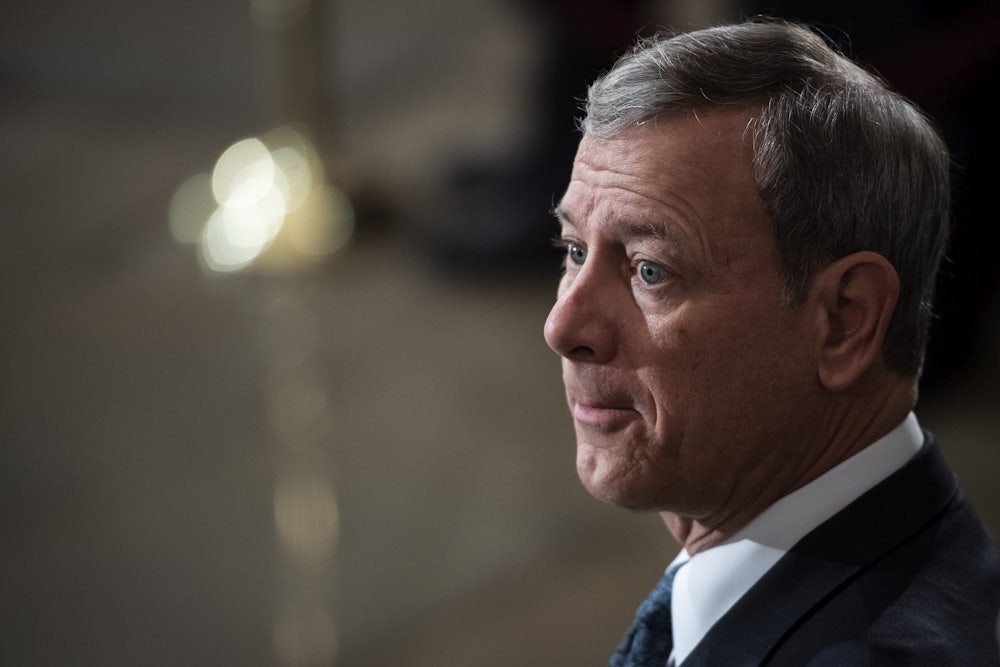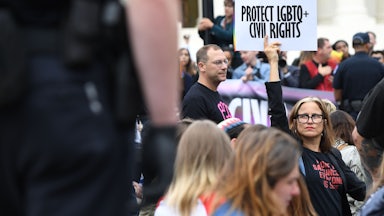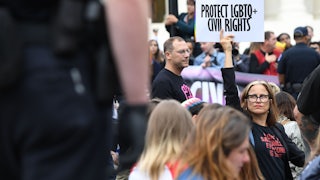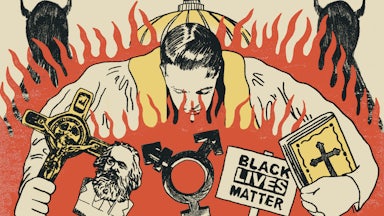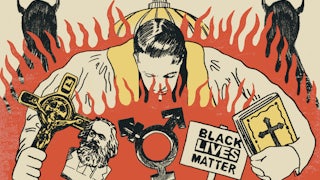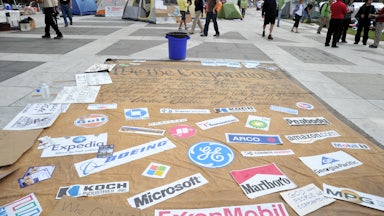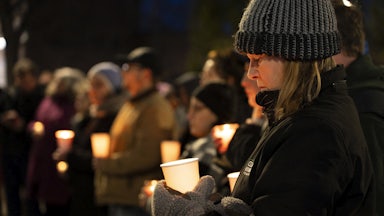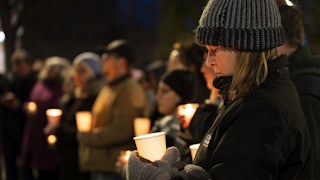The Supreme Court on Thursday unanimously sided with a Catholic foster care agency in Philadelphia that refused to help place children with same-sex couples, ruling that the city had improperly declined to work with the agency because of its religious beliefs. At the same time, the justices avoided a more sweeping ruling on when and how Americans’ religious beliefs can overcome state and federal efforts to protect gay and transgender Americans from discrimination.
The case, Fulton v. City of Philadelphia, sprang from a clash between the city’s policies against anti-LGBT discrimination and the church teachings that guided Catholic Social Services’ mission. Writing for the court, Chief Justice John Roberts avoided deciding which of these interests ranks higher by ruling on more technical grounds, leaning heavily on the city’s ability to provide an exemption—and its refusal to give one.
“CSS seeks only an accommodation that will allow it to continue serving the children of Philadelphia in a manner consistent with its religious beliefs; it does not seek to impose those beliefs on anyone else,” he wrote. “The refusal of Philadelphia to contract with CSS for the provision of foster care services unless it agrees to certify same-sex couples as foster parents cannot survive strict scrutiny, and violates the First Amendment.”
Though the justices agreed on the outcome, they disagreed on whether the court had to overturn Employment Division v. Smith, one of its major precedents on the Free Exercise Clause, to decide the case. The court’s six-justice conservative bloc split evenly on the question, with Roberts and Justices Brett Kavanaugh and Amy Coney Barrett opting not to overturn the precedent in question in this case. Justices Stephen Breyer, Sonia Sotomayor, and Elena Kagan joined with them to form a majority.
As a result, the decision in Fulton fits within two familiar trends. The Supreme Court is still strongly inclined to favor litigants who bring religious freedom claims before it, and has handed down a series of major rulings in their favor in recent years. At the same time, the justices appear unwilling to rule conclusively that religious beliefs can overcome anti-discrimination laws that protect gay and transgender Americans in all cases—at least for now.
The underlying dispute began in 2018 when city officials learned through media reports that a Catholic foster care agency in the city refused to work with same-sex couples. The agency in question, Catholic Social Services, cited church teachings to justify its refusal. Philadelphia officials determined that the agency’s decision violated a nondiscrimination provision in its contract with the city, which was required by the city’s anti-discrimination ordinance. After attempts to negotiate a solution failed, Philadelphia stopped regularly referring children to CSS for potential foster placement.
“CSS lacks a constitutional right to demand that [Philadelphia] offer it a contract that omits the same nondiscrimination requirement every other [foster care agency] must follow when performing services for the city,” Philadelphia argued in its brief for the Supreme Court last year. “That conclusion is supported both by the government’s broad authority when managing its own contractors, and by the principle that neutral laws of general application do not generally ‘prohibit the free exercise’ of religion.”
Later that year, the Archdiocese of Philadelphia sued the city on CSS’s behalf, along with Sharonell Fulton and other foster parents. They alleged that the city’s refusal to work with CSS violated the First Amendment’s protections for religious freedom. The archdiocese also claimed that it hadn’t actually violated the city’s anti-discrimination ordinance. “If a same-sex couple were to ask for a home study, CSS would refer them to another nearby agency,” it claimed in its brief for the justices last year. “But the record shows that no same-sex couple had ever approached CSS in this way. Nor is there any evidence CSS’s religious beliefs prevented—or even discouraged—anyone from fostering.”
Those who have followed religious freedom disputes at the Supreme Court in recent years probably have a strong sense of déjà vu at this point. Over the past decade, the justices have heard multiple cases to decide when a person or organization’s religious beliefs allow them to claim exemptions from general laws. Perhaps the most famous dispute was Masterpiece Cakeshop v. Colorado Civil Rights Commission in 2018, which pitted a Christian baker who declined to work with a gay couple against the state’s anti-discrimination laws. The Supreme Court narrowly ruled in the baker’s favor without delving into the deeper legal issues at hand.
Both the federal district court in Philadelphia and the Third Circuit Court of Appeals ruled against Fulton and the archdiocese. Each of the courts cited the Supreme Court’s landmark 1990 ruling in Employment Division v. Smith. In that case, two Native American men in Oregon had challenged the state’s refusal to provide them with unemployment benefits after they lost their jobs for using peyote, an illegal drug with sacramental purposes in the Native American Church. They also argued that state officials had violated the Free Exercise Clause by discriminating against their religious beliefs.
The Supreme Court ruled against them in an opinion written by none other than Justice Antonin Scalia. The conservative jurist often favored believers’ claims in religious freedom cases that came before him over the years. In Smith, however, Scalia concluded that courts could not use the Free Exercise Clause to carve out exemptions from what he described as “neutral laws of general applicability.” Allowing Americans to opt out of basic criminal and administrative laws “contradicts both constitutional tradition and common sense” and “would lead towards anarchy,” he wrote. Scalia also expressed discomfort with the idea of judges weighing the validity or importance of specific religious beliefs along the way.
The court’s ruling in Smith prompted a wave of public outrage. In 1993, President Bill Clinton signed the Religious Freedom Restoration Act into law. Passed with the overwhelming support of Congress, RFRA allowed plaintiffs to sue the federal government when the application of federal laws infringes upon a person’s religious beliefs. The government can still win the case if it shows that enforcing the law in question serves a “compelling government interest” and can’t be carried out in a less burdensome way, effectively restoring the legal test that had existed before Smith. RFRA does not apply to state and local officials, although many states—including Pennsylvania—have similar laws on the books.
Smith also proved to be deeply controversial among conservative legal scholars, who typically venerate Scalia. As I noted last February, some of them have argued that the ruling effectively leaves the constitutional right to religious freedom in the hands of majoritarian bodies like Congress and the presidency. Many of the court’s other conservative justices offered similar qualms about Smith in recent years, leading some legal activists to push for an outright challenge to Smith itself. When the court agreed to take up Fulton last spring, it explicitly asked the parties to brief the court on whether Smith should be “revisited.”
At oral arguments, the court’s conservative bloc signaled it would abandon Scalia’s pragmatic approach to judicial power and religious freedom in favor of something else. “Look, if we are honest about what’s really going on here, it’s not about ensuring that same-sex couples in Philadelphia have the opportunity to be foster parents,” Justice Samuel Alito, the court’s least-subtle member, told the lawyer representing the city of Philadelphia. “It’s the fact that the city can’t stand the message that Catholic Social Services and the archdiocese are sending by continuing to adhere to the old-fashioned view about marriage.”
Writing for the court, however, Roberts opted to use a different line of precedent to rule in the agency’s favor. “CSS urges us to overrule Smith, and the concurrences in the judgment argue in favor of doing so,” he wrote. “But we need not revisit that decision here. This case falls outside Smith because the City has burdened the religious exercise of CSS through policies that do not meet the requirement of being neutral and generally applicable.” Since the city’s contract allows for exemptions from the anti-discrimination provisions, Roberts reasoned, the problem actually hinged on the refusal to grant one.
The result met with sharp criticism from Justice Samuel Alito, who called on the court to overturn Smith once and for all. “This decision might as well be written on the dissolving paper sold in magic shops,” he wrote in a concurring opinion joined by Justice Clarence Thomas and Neil Gorsuch that sounded more like a dissent. “The city has been adamant about pressuring CSS to give in, and if the city wants to get around today’s decision, it can simply eliminate the never-used exemption power. If it does that, then, voilà, today’s decision will vanish—and the parties will be back where they started.”
Some of Alito’s colleagues appeared unwilling to overturn Smith based on his hypothetical scenario. In a concurring opinion, Barrett noted that there was no clear originalist alternative to Smith because the historical record is “more silent than supportive on the question whether the founding generation understood the First Amendment to require religious exemptions from generally applicable laws in at least some circumstances.” She argued that “the textual and structural arguments against Smith are more compelling” but could not find a clear answer for what should replace Smith if it were struck down.
“The prevailing assumption seems to be that strict scrutiny would apply whenever a neutral and generally applicable law burdens religious exercise,” Barrett continued. “But I am skeptical about swapping Smith’s categorical anti-discrimination approach for an equally categorical strict scrutiny regime, particularly when this Court’s resolution of conflicts between generally applicable laws and other First Amendment rights—like speech and assembly—has been much more nuanced.” In either event, she concluded, the court didn’t need to figure it out to decide the case before it.
An optimist might take this as a victory for Smith and for Scalia’s pragmatic approach to Free Exercise claims for general and neutral laws. A pessimist might instead note that Barrett’s concurring opinion merely invites further litigation where conservative scholars and legal activists can try to answer her questions. But the most straightforward assessment is that the status quo prevails, albeit while inching closer to the religious freedom side than to the anti-discrimination side.
Toward the end of his opinion, Roberts addressed the other half of the equation: Philadelphia’s interest in “the equal treatment of prospective foster parents and foster children” by private foster agencies. “We do not doubt that this interest is a weighty one, for ‘our society has come to the recognition that gay persons and gay couples cannot be treated as social outcasts or as inferior in dignity and worth,’” he wrote, quoting from the court’s ruling in Masterpiece Cakeshop three years ago. “On the facts of this case, however, this interest cannot justify denying CSS an exception for its religious exercise.” Whether that interest can prevail with other facts in other cases is still unclear.
